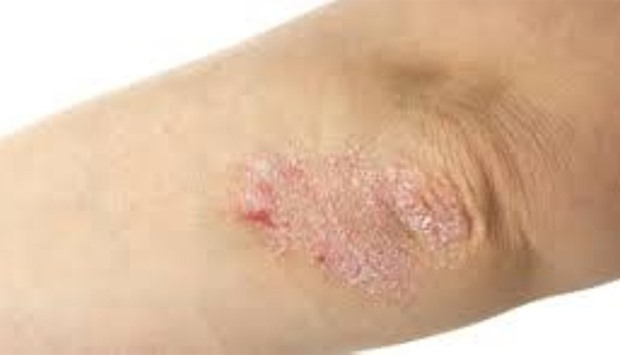“Psoriasis is a persistent, chronic, systemic disease of the immune system which can be hereditary. It is characterised by over production of skin cells, usually resulting in thick, silvery scales and flaky, irritated skin. Psoriasis affects approximately 3% of the Qatar population. Men and women develop psoriasis at equal rates. The condition is often diagnosed between the ages of 15 and 35, but it can develop at any age. It is not contagious,” said Dr Ahmad Hazem Takiddin, Dermatology and Venereology Consultant at HMC.
Psoriasis changes the life cycle of skin cells. It causes cells to rapidly build up on the surface of the skin. It typically occurs on the knees, elbows and scalp but can affect the torso, palms and soles of the feet. There are several types of psoriasis. Most types go through cycles, flaring for a few weeks or months, then subsiding for a time or even going into complete remission.
Despite its prevalence, psoriasis is widely misunderstood. Many people with psoriasis experience anxiety, embarrassment and depression. They face discrimination because others fear the condition is contagious. In addition to the psychological and social impact, psoriasis increases risk for heart disease, stroke, diabetes, Crohn’s disease, hypertension, obesity, depression and other serious health conditions if not treated.
“Psoriasis is much more than just a skin condition. It can significantly impact one’s emotional well-being and quality of life,” said Dr Takiddin. “Those with psoriasis often feel embarrassed about their appearance. They may face social difficulties due to other people’s perception that psoriasis is infectious, which is not true. People develop psoriasis through a combination of genes and exposure to external triggers. Triggers can include stress, skin injury (such as cuts or scrapes), certain infections and some medication.”
Dr Takiddin says it is important to promote better understanding of the various types of psoriasis, including psoriatic arthritis, among both the general public and healthcare professionals. He also encouraged those concerned they have psoriasis to seek medical advice. Adding that it is important to ensure individuals are correctly diagnosed and get the right medical treatment.
“Psoriatic arthritis is an inflammatory arthritis associated with psoriasis. Most people develop psoriasis first and are later diagnosed with psoriatic arthritis, but the joint problems can sometimes begin before skin lesions appear. Like psoriasis, psoriatic arthritis is treatable but there is no cure. The focus is on controlling symptoms and preventing damage to joints. Without treatment, psoriatic arthritis may be disabling,” said Dr Takiddin.
Treatment options for psoriasis include creams and ointments applied to the skin, phototherapy (controlled exposure to certain types of ultraviolet light), and medication that reduces the production of skin cells.
“Psoriasis symptoms can be worsened by lifestyle factors such as being overweight or obese, smoking, alcohol consumption, and an unhealthy diet consisting of foods high in saturated fats, starch and sugar. Maintaining a healthy diet, regular physical exercise and adequate sleep are important for everyone but particularly for those with, or at risk of developing, psoriasis,” said Dr. Takiddin.
For more information on psoriasis, including information on how to access HMC’s dermatology specialist services, visit psoriasis.hamad.qa

